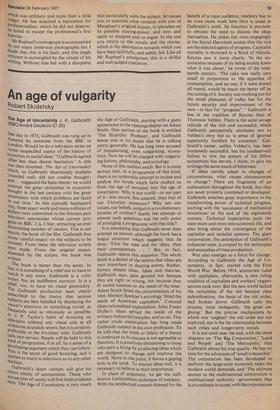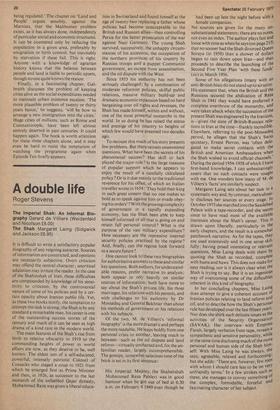An age of vulgarity
Robert Skidelsky
The Age of Uncertainty J. K. Galbraith (BBC/Andre Deutsch £7.25) One day in 1973, Galbraith was rung up in America by someone from the BBC in London. Would he do a television series on some unspecified aspect of the history of economic oi social ideas.' ? Galbraith agreed 'after less than decent hesitation.' A title Was then invented: The Age of Uncertainty Which, as Galbraith disarmingly explains sounded well; did not confine thought; and • • . suggested the basic theme : we would contrast the great certainties in economic thought in the last century with the great uncertainty with which problems are faced in our time.' In this typically haphazard way, three years' work and many millions of dollars were committed to the thirteen-part television spectacular whose current progress on BBC 2 is, I fear, attracting an ever diminishing number of viewers. This is not exactly the book of the film. Galbraith first wrote 'careful essays' on the subjects to be covered. From these the television scripts were made. From the original essays, amended by the scripts, the book was written.
The book is better than the series. In fact, it is something of a relief not to have to watch it any more. Galbraith is a witty writer, but an indifferent narrator. It is a relief,
too, to have no visual gimmickry.
he Galbraith production team clearly subscribed to the theory that serious subjects are best handled by displacing the viewer's attention to something trivial, as frequently and as obviously as possible. A' P. Taylor's habit of lecturing on television without any visual aids at all strikes me as unduly severe, but it is certainly Preferable to the frivolous 'aids' Galbraith calls into service. People will be held to this kind of programme, if at all, by a sense of a developing argument which they can follow. This is the secret of good lecturing, and it aPPlies as much to television as to any other Medium.
Galbraith's latest venture will give his critics plenty of ammunition. Those who ,accuse him of vanity will find fresh evidence "ere. The Age of Uncertainty is very much
the Age of Galbraith, starting with a guest appearance in the opening chapter on Adam Smith. One section of the book is entitled 'The Stupidity Problem', and Galbraith leaves one in no doubt that he is talking pretty generally. He has long been accused of popularising, even vulgarising, economics. Now he will be charged with vulgarising history, philosophy, and sociology. None of this matters much. But it is more serious that, in a programme of this kind, there is no systematic attempt to isolate and analyse the forces which have pushed us from the age of certainty into the age of uncertainty. Why is our world—or our part of it—less secure, less assured, than that of our Victorian ancestors? Why are our values, our beliefs, subject to a revolutionary process of erosion ? Surely the attempt to answer such questions was the only point of arranging a programme with this title?
It is interesting that Galbraith never does attempt an answer, although the book has a bogus structure which suggests that he does: 'First the men and the ideas, then
their consequences . ,' But, in fact, Galbraith rejects this sequence. The whole book is a denial of the notion that ideas are very important in shaping events. Rather, history shapes ideas. Ideas and theories, Galbraith says, gain ground not because they are right or wrong, but because they fit vested interests or the needs of the hour. Adam Smith fitted the circumstances of his time. Herbert Spencer's sociology 'fitted the needs of American capitalism.' Colonial ideas rationalised exploitation. John Foster Dulles's ideas served the needs of the military-industrial complex, and so on. This rather crude materialism has long made Galbraith suspect in his own profession. To be told that the truth or falsity of a theory is irrelevant to its success is not agreeable to theorists. It is positively threatening to those who earn a living by producing ideas which are designed to change and improve the world. More to the point, it leaves a gaping hole in the book. To discuss ideas well, it is necessary to believe in their importance.
In place of argument, we get the wellknown Galbraithian technique of mockery. With the intellectual content thinned for the benefit of a mass audience, mockery has to do even more work here than is usual in Galbraith's work. Its function is precisely to obviate the need to discuss the ideas themselves. He pokes fun most engagingly at the Social Darwinist notion that the rich are the selected agents of progress. Capitalist morality is drowned in a flood of ridicule. Keynes saw it more clearly. 'In the unconscious recesses of its being society knew what it was about,' he wrote of the nineteenth century. 'The cake was really very small in proportion to the appetites of consumption, and no one, if it were shared all round, would be much the better off by the cutting of it. Society was working not for the small pleasures of today but for the future security and improvement of the race—in fact for "progress" .' Galbraith is less in the tradition of Keynes than of Thorstein Veblen. There is the same savage ridicule of the rich and successful, which Galbraith perceptively attributes not to Veblen's envy but to 'a sense of ignored superiority fortified by contempt.' Galbraith's career, unlike Veblen's, has been immensely successful, but his (undeserved) failure to win the esteem of his fellow economists has served, I think, to give his writings the same touch of bitterness.
If ideas merely adapt to changes of circumstance, what causes circumstances to change? There are fragments of an explanation throughout the book, but they are never properly combined or developed. Galbraith attaches great importance to the transforming power of technical progress, starting with the 'succession of mechanical inventions' at the end of the eighteenth century. Technical imperatives push the state more and more into economic life, and also bring about the convergence of the capitalist and socialist systems. The giant corporation, the centrepiece of Galbraith's industrial state, is created by the techniques and necessities of mass production.
War also emerges as a force for change. According to Galbraith the Age of Uncertainty, in fact, started with the First World War, Before 1914, aristocrats ruled with capitalists; afterwards, a new ruling coalition of capitalists and workers' organisations took over. But the new world lacked the certainties of the old because class subordination, the basis of the old order, had broken down. Galbraith calls the process, most inelegantly, 'the great ungluing.' But the precise mechanisms by which war 'unglues' the old order are not explored, nor is the the relationship between such crises and longer-term trends.
It is not until near the end, with the three chapters on 'The Big Corporation,' Land and People' and 'The Metropolis,' that Galbraith shows his true quality. He has no
time for the advocates of 'small is beautiful.' The corporation has been developed to
perform the large-scale economic tasks the modern world demands, and 'The ultimate answer to the multinational corporation is multinational authority—government that is co-ordinate in scope, with thecorporations being regulated.' The chapter on 'Land and People' argues sensibly, against the Marxists, that the Malthusian problem exists, as it has always done, independently of particular social and economic structures. It can be countered only by reducing the population in a given area, preferably by emigration or birth control, but inevitably by starvation if these fail. This is right. Anyone with a knowledge of agrarian history knows that the balance between people and land is liable to periodic upsets, though no one quite knows the reason.
Finally, in a fascinating chapter, Galbraith discusses the problem of keeping cities alive as the social expenditures needed to maintain urban existence escalate. 'The more plausible problem of twenty or thirty years hence,' he suggests, 'will be how to arrange a new immigration into the cities.' Huge cities of millions, such as Rome and Constantinople, have been left almost entirely deserted in past centuries. It could happen again. The book is worth attention for these three chapters alone, and it may even be hard to resist the temptation of watching the programme again when Episode Ten finally appears.



































 Previous page
Previous page